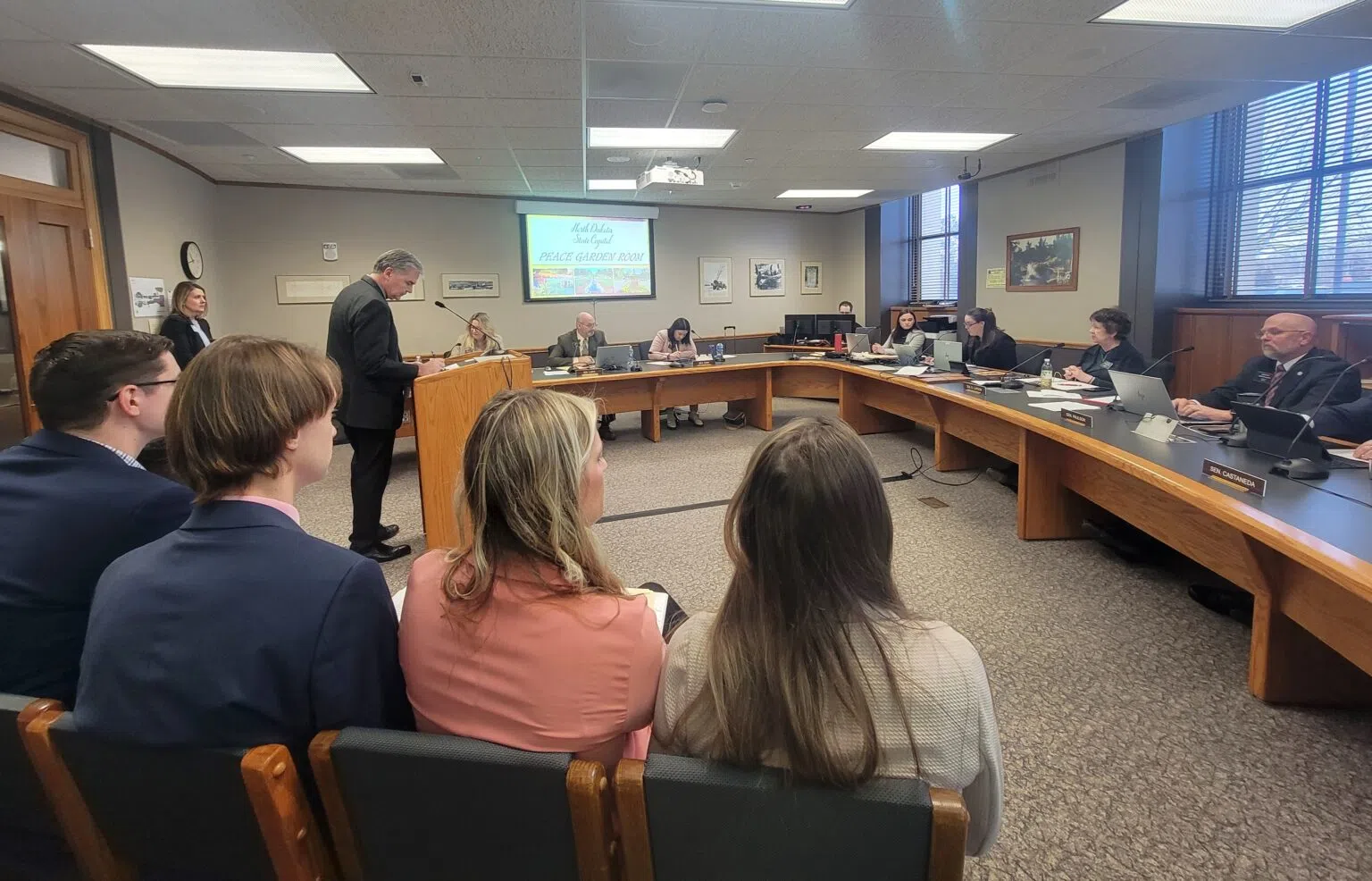
Ethics Commission staff listen as Geoff Simon, executive director of the Western Dakota Energy Association, speaks against North Dakota’s two-year lobbying prohibition on elected officials who leave office during a Senate Judiciary Committee hearing on Jan. 8, 2025. (Jacob Orledge/North Dakota Monitor)
By: Mary Steurer
BISMARCK, N.D. (North Dakota Monitor) – The North Dakota Ethics Commission received pushback from lawmakers Wednesday on one of its first bills, with a nearly unanimous recommendation to reject it.
The Ethics Commission can issue advisory opinions to help officials under its jurisdiction understand how ethics laws and rules apply in certain circumstances.
Currently, the commission may only publish opinions if someone specifically requests it. House Bill 1046, requested by the commission, would change this to allow the commission to issue advisory opinions of its own volition.
“We have consistent questions that come up, but nobody kind of gets around to asking for the advisory opinion,” Executive Director Rebecca Binstock said during a Wednesday hearing before the House Judiciary Committee. “In those instances, the commission would like to say something has come to its attention multiple times, and so let’s go ahead and provide some clarity on this situation.”
Several members of the committee voiced skepticism, wondering if this would give the commission too much power.
“By allowing the commission to just start weighing in on things, they effectively are creating rules and whatnot beyond what has been requested,” Rep. SuAnn Olson, R-Baldwin, said.
Once requested, advisory opinions are authorized and approved by commission members by a majority vote. Some members of the House Judiciary Committee also expressed concerns that this was too low of a threshold.
The committee voted 13-1 to oppose House Bill 1046 after adopting an amendment to require approval from at least four of the five members of the Ethics Commission to issue an advisory opinion.
The House Judiciary Committee’s do-not-pass recommendation is the latest instance of the Legislature opposing the Ethics Commission’s requests. The bill will advance to the House floor for a vote by the full chamber.
Another Ethics Commission-related bill on Wednesday cleared the Senate Judiciary Committee with a unanimous do-pass recommendation.
Senate Bill 2052, also requested by the commission, would clarify that the two-year prohibition on lobbying for public officials that leave office only applies to those who were elected. It wouldn’t change the law, just remove some ambiguity, Binstock said.
Geoff Simon, executive director of the Western Dakota Energy Association, testified against the proposal. Simon also chaired a committee that opposed the 2018 constitutional amendment that created the Ethics Commission.
He said while he acknowledges the Senate bill only seeks to clarify an existing law, he believes North Dakota’s two-year lobbying prohibition is unconstitutional.
He pointed to a 2024 ruling from the 8th Circuit Court of Appeals that found a similar two-year prohibition adopted in Missouri violated the First Amendment. North Dakota is also part of the 8th Circuit.
“At some point, I suspect that there will be perhaps a former legislator or a former state office holder who would challenge this,” he said.
Committee member Sen. Janne Myrdal, R-Edinburg, agreed with Simon.
“I hope this ends up in court,” Myrdal said.
Several other ethics-related bills are being proposed this session, including:
- Changes to its system for investigating potential ethics violations, including an amendment granting the Ethics Commission subpoena power or authorizing the commission to apply for a subpoena from a district court judge;
- Legislation creating a process for enforcing financial disclosure requirements for elected officials; and
- A new law to protect whistleblowers who provide information to the commission, or assist in an investigation.
The commission is also seeking a larger budget for the 2025-2027 biennium, including funding for a new full-time staff member.




Comments